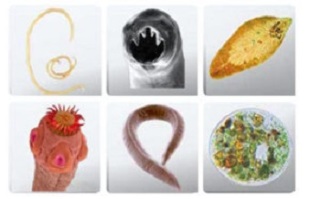Deterioration is often caused by different types of parasites that are mistakenly confused with stress or vitamin deficiency. Where and what analysis should you perform to identify the infection?
Examining parasites - how and what to take - this question arises when health deteriorates for no apparent reason.
Different types of parasites that are ideally adapted to exist in the human body may not manifest for long. Usually, children attending school or kindergarten are screened from time to time for helminths. However, parasite infections are also very common in adults.
Some symptoms of helminthic infection include:
- decrease in blood hemoglobin levels;
- poor appetite;
- sleep disorder;
- weight loss;
- increased body temperature.
has similarities to various pathological conditions.
The likelihood of infection is very high. Many people, aware of this, are carriers of one kind or another. In addition, damage to human health can be caused not only by worms but also by some protozoa. Their presence in the human body leads to toxoplasmosis and other dangerous diseases. It is clear that an analysis of parasites in the human body should be performed to detect the infection in a timely manner and to prescribe appropriate treatment as soon as possible. What tests should be passed on to the parasites, the local therapist will tell.
When to test for parasites in adults
Experts recommend testing for parasites if one or more of the listed symptoms occur:
- Digestive problems: tendency to constipation, diarrhea, nausea, vomiting, bloating.
- Skin is pale due to vitamin and nutrient deficiency.
- Rapid fatigue, energy loss, apathy are observed.
- Weight decreased rapidly.
- Allergic manifestations occurred in the absence of obvious irritants (such a reaction is caused by worms waste products).
It is recommended to perform tests (comprehensive analysis of parasites) if the body is highly resistant to colds due to a decrease in immunity.
In addition, itching of the skin around the anus indicates the presence of helminthic invasion (enterobiasis), which can be confirmed by testing for parasites.
What tests are performed to identify parasites in the human body?
If you suspect you have been infected with helminths or other types of parasites, we want to start treatment immediately. However, to prescribe the necessary medications, you must first check for the presence of parasites, as you need to understand which species have settled in the body. You can find out where to test for parasites at your nearest clinic.
Stool analysis

The simplest and most common solution in this case is fecal analysis, in which professionals look for helminth eggs.
This type of analysis allows you to determine the presence of:
- round worms;
- trematodes or flukes;
- tapeworms.
However, this type of analysis has a significant drawback: the results of the analysis of the faeces of parasites are not always reliable, as the parasites multiply during certain periods and may not lay eggs for a long time. Therefore, for greater reliability, the analysis of parasite feces is repeated 2-3 times with an interval of several days.
Advanced stool analysis
In addition to standard stool analysis, there is a detailed one that is much more reliable and accurate. This diagnosis, which is based on PCR technology, helps to detect the DNA of a parasite, including dead or dormant conditions. This method makes it possible to find out what worms are in the body, which means that the doctor will be able to determine which medicine can cope more effectively with the disease.
Scraping Enterobiasis
Pinworms are one of the most common helminth types. To test for these types of parasites, you need to discard the skin folds around the anus where their eggs are found. To improve the accuracy of the results of such a test, it should also be repeated after a few days. This test method is painless and, like standard parasite analysis, is suitable for both adults and children.
Blood test
A parasitic infection can be detected with high accuracy by performing an immunoenzymatic blood test. If you pass this type of analysis, you can detect the presence of antibody and antigen from almost any type of parasite. The antigens in this case are the waste products of the parasites and themselves, and the antibodies are immunoglobulins that are synthesized in the human body to fight infections. This method can be used to diagnose the disease at an early stage, when there are not many parasites yet, and they are easy to treat.
Blood must be given from a vein for this analysis. The result, which is at least 95% reliable, must be known within 9 days at the latest. Of course, such research is more suitable for adults.
In addition to this method, some other blood testing methods are used to identify parasites, especially in the acute form of helminthiasis. They are based on a variety of test methods that allow for the high-precision diagnosis of different types of infections in children and adults.
Some health care facilities offer comprehensive blood tests to detect different types of helminths.
To prepare the analysis:
- that the last meal was no later than 10–12 h before the study;
- exclude fatty, smoked and salty foods from the previous day’s diet;
- Exclude smoking and alcohol consumption 24 hours before the test.



























